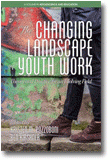
The Changing Landscape of Youth Work
Theory and Practice for an Evolving Field
Edited by:
Kristen M. Pozzoboni, San Francisco State University
Ben Kirshner, University of Colorado School of Education
A volume in the series: Adolescence and Education. Editor(s): Daniela K. DiGiacomo, University of Kentucky. Erica Van Steenis, University of California Irvine.
Published 2016
The purpose of this book is to compile and publicize the best current thinking about training and professional development for youth workers. School age youth spend far more of their time outside of school than inside of school. The United States boasts a rich and vibrant ecosystem of Out‐of‐School Time programs and funders, ranging from grassroots neighborhood centers to national Boys and Girls Clubs. The research community, too, has produced some scientific consensus about defining features of high quality youth development settings and the importance of after‐school and informal programs for youth. But we know far less about the people who provide support, guidance, and mentoring to youth in these settings. What do youth workers do? What kinds of training, certification, and job security do they have?
Unlike K‐12 classroom teaching, a profession with longstanding – if contested – legitimacy and recognition, “youth work” does not call forth familiar imagery or cultural narratives. Ask someone what a youth worker does and they are just as likely to think you are talking about a young person working at her first job as they are to think you mean a young adult who works with youth. This absence of shared archetypes or mental models is matched by a shortage of policies or professional associations that clearly define youth work and assume responsibility for training and preparation. This is a problem because the functions performed by youth workers outside of school are critical for positive youth development, especially in our current context governed by widening income inequality. The US has seen a decline in social mobility and an increase in income inequality and racial segregation. This places a greater premium on the role of OST programs in supporting access and equity to learning opportunities for children, particularly for those growing up in neighborhoods of concentrated poverty.
Fortunately, in the past decade there has been an emergence of research and policy arguments about the importance of naming, defining, and attending to the profession of youth work. A report released in 2013 by the DC Children and Youth Investment Corporation suggests employment opportunities for youth workers are growing faster than the national average; and as the workforce increases, so will efforts to professionalize it through specialized training and credentials. Our purpose in this volume is to build on that momentum by bringing together the best scholarship and policy ideas – coming from in and outside of higher education – about conceptions of youth work and optimal types of preparation and professional development.
CONTENTS
Introduction: The Changing Landscape of Youth Work: Theory and Practice for an Evolving Field, Kristen M. Pozzoboni and Ben Kirshner. SECTION I: CONCEPTIONS OF YOUTH WORK AND YOUTH WORKERS. Voluntary Association, Youth Voice, and Collective Action: Youth Work in Places Where There Are No (Professional) Youth Workers, Carole MacNeil, Steven Eric Krauss, and Shepherd Zeldin. Credentialing for Youth Work: Expanding Our Thinking, Elizabeth Starr and Ellen Gannett. Youth Worker Professional Development: Moving from Practicing the Symbolic to Working Substantively, Michael L. Baizerman and Ross VeLure Roholt. SECTION II: HOW SHOULD YOUTH WORKERS BE PREPARED? Not Anyone Can Do This Work: Preparing Youth Workers in a Graduate School of Education, Gretchen Brion‐Meisels, Mandy Savitz‐Romer, and Deepa Vasudevan. Building Pathways from Research to Practice: Preparing Youth Development Professionals through a Blended Online Master’s Degree Program, Barry A. Garst, Edmond P. Bowers, William Quinn, and Ryan J. Gagnon. Becoming a Youth Worker in a University‐Based Community of Practice, Laurie Ross. Honoring and Supporting Youth Work Intellectuals, Michael Heathfield and Dana Fusco. Professional Learning Communities: An Alternative to the One‐Stop Workshop, Femi Vance, Emily Salvaterra, Jocelyn Atkins Michelsen, and Corey Newhouse. Compelling Models of Youth Worker Recruitment and Preparation, Maranda Ward and Jeanne Dairaghi. SECTION III: WHAT SHOULD YOUTH WORKERS KNOW? Re‐Envisioning Youth Work Education for Mental Health Care and Suicide Intervention, Patti Ranahan and Jennifer White. Rethinking Evaluation Capacity in Youth Development Programs: A New Approach for Engaging Youth Workers in Program Evaluation, Mary E. Arnold, Melissa Cater, and Marc T. Braverman. Ethical Dilemmas Experienced By Youth Workers: Implications for Practice and Professional Development, Kathrin Walker and Tamara Ginger Weiss. Youth Work for Social Change: Preparing Individuals to Work with Youth in Diverse Urban Contexts, Kristen Atkinson, Emilia Chico, and Stacey S. Horn. About the Editors. About the Contributors.
-
Paperback9781681235639
Web price: $45.04 (Reg. 52.99)
-
Hardcover9781681235646
Web price: $80.74 (Reg. 94.99)
- eBook9781681235653

- EDU036000 - EDUCATION: Organizations & Institutions
- EDU031000 - EDUCATION: COUNSELING: Career Guidance
- EDU056000 - EDUCATION: Vocational
-
 #youthaction
Becoming Political in the Digital Age
#youthaction
Becoming Political in the Digital Age
-
 Black Girl Civics
Expanding and Navigating the Boundaries of Civic Engagement
Black Girl Civics
Expanding and Navigating the Boundaries of Civic Engagement
-
 Educating Adolescents
Challenges and Strategies
Educating Adolescents
Challenges and Strategies
-
 Peer Relationships and Adjustment at School
Peer Relationships and Adjustment at School
-
 Power, Equity and (Re)Design
Bridging Learning and Critical Theories in Learning Ecologies for Youth
Power, Equity and (Re)Design
Bridging Learning and Critical Theories in Learning Ecologies for Youth
-
 Self-Efficacy Beliefs of Adolescents
Self-Efficacy Beliefs of Adolescents
-
 The Ones We Remember
Scholars Reflect on Teachers Who Made a Difference
The Ones We Remember
Scholars Reflect on Teachers Who Made a Difference

